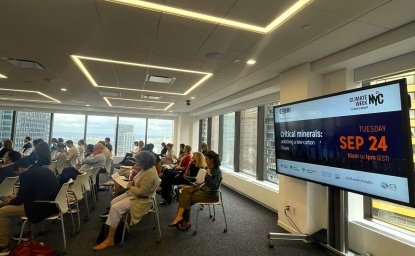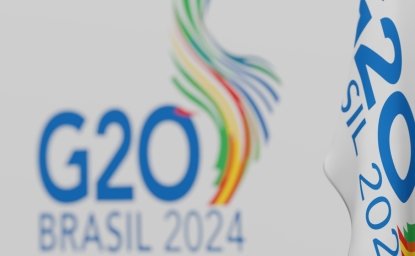
A blog of the Brazil Institute
Over the last decade, the advent of social media has transformed the way that the electorate interacts with the political system in Brazil. New political movements such as Agora! and Acredito have relied heavily on social media to gather support. Likewise, policymakers and politicians are more able than ever before to communicate directly with voters. However, one facet of social media has threatened to adversely affect Brazil’s democracy: social media bots. Bots, which were active and influential during the 2014 presidential election in Brazil, could have a significant impact on the upcoming 2018 election.
What Are Bots, and What Do They Do?
Social media bots are automated accounts that can be programmed to carry out a given task. In many contexts, bots are used with the express purpose of imitating human behavior by posting content, following accounts, or interacting with real users. While many bots are easy to recognize, advances in natural language processing and artificial intelligence have made bots increasingly lifelike.
In recent years, bots have been active and influential during important political moments in Brazil. One notable example occurred during the second-round presidential debate in 2014. An analysis by the Federal University of Espírito Santo found evidence of bot activity when, within the first fifteen minutes of the debate, Twitter mentions of then-candidate Aècio Neves experienced an inorganic increase, tripling in number. Further evidence came from a 2017 study by the Getúlio Vargas Foundation’s Department of Public Policy Analysis (FGV/DAPP), which reported that over 10 percent of all relevant Twitter interactions during the debate involved suspicious accounts. These accounts—which were obviously automated—created one post per second, if not more.
In analyzing the 2014 debate, as well as other notable events such as the 2015 impeachment protests and the 2016 São Paulo elections, the FGV study discovered an important underlying pattern. During each event, bot activity concentrated at the extremes of the political spectrum, with most bots rapidly posting content in order to inflate the appearance of support for a given candidate or point of view.
This specific pattern of bot activity has serious implications for the integrity of past, present, and future Brazilian elections, and constitutes what FGV/DAPP director Marco Aurelio Ruediger describes as a “threat to the quality of public debate in Brazil.” By inflating the visibility of extreme candidates and ideologies on a large scale, bots can exacerbate the already-ongoing phenomenon of political polarization, which in turn can lead to a distorted and excessively contentious election.
Bots and Fake News
Bots can also exercise influence by disseminating false information, more commonly known as fake news, on a large scale. Brazil has already demonstrated a susceptibility to the spread of fake news on several occasions.
During the recent truckers strike, false information about supposed food shortages spread within thousands of WhatsApp groups. As the strike was ongoing, journalists from the Correio Braziliense participated in trucker-led WhatsApp groups and reportedly received messages advertising the sale of social media bot accounts—with the express purpose of spreading false information.
The spread of misinformation halted shortly after the strike ended. In the context of an election, however, fake news could have a much more permanent effect. Because fake news disseminated by bots can spread at the same rate as legitimate news, voters find themselves inundated with information, often unable to differentiate between truth and fiction. The resulting confusion could compromise voters’ capacity to make an informed decision.
Where Do Bots Come From?
The threat that bots pose to Brazilian democratic processes underscores the importance of understanding where bots come from. Social media’s inherent anonymity can complicate attempts to identify a bot’s origin; nevertheless, tentative connections exist between campaign organizations and bot activity in Brazil. For example, an internal government memorandum that was leaked in early 2015 refers to bots used by the campaigns of both Dilma Rousseff and her opponent, Aécio Neves. According to the memorandum, both campaigns used bots in order to disseminate content in favor of their respective candidates. In fact, while the pro-Dilma bots were deactivated following a successful campaign, several Neves campaign bots continued to act following the election, potentially contributing to the 2015 movement to impeach President Rousseff.
A 2017 study by FGV also showed evidence of a connection between bots and presidential campaigns in Brazil. The study found that, although the number of bots posting politically charged content numbered in the hundreds, most of the content originated from just a few websites. Many of these websites’ domains were owned either by companies who received payments from official campaigns or by the official campaigns themselves.
In addition, the study drew possible connections between bot activity in Brazil and foreign actors. The study found that some of the bots that were allegedly connected with the Neves campaign displayed evidence of foreign origin, with suspicious profile pictures that contained Cyrillic characters and Russian landmarks. Although there is not currently a definitive explanation for the apparent Russian-origin of these bots, their existence suggests that Brazil may not be exempt from the questions of foreign electoral interference that have plagued other nations around the world.
Responses
In 2018, bots have already been active in the months leading up to the election. A study conducted by FGV/DAPP between June 22 and 23 found that more than 20 percent of the re-tweets related to Lula or Jair Bolsonaro, the two candidates with the most social media presence, were performed by bots. Having demonstrated the potential of widespread bot activity in the 2018 election, the results of this analysis raise questions regarding what can be done to address this problem.
Thus far, most attempts to combat electoral social media manipulation have centered on fake news, with less consideration for the connections between bots, campaigns, and foreign entities. In January of 2018, under the direction of the Superior Electoral Court, Brazil’s Federal Police established a task force with the specific goal of preventing and limiting fake news during the election. In the private sector, Facebook removed almost 200 pages run by several individuals connected to the right-wing activist organization Movimento Brasil Livre, whose names were not disclosed. Facebook asserted that the pages were part of a larger network, which was operated with the intent to spread misinformation. While the measure was generally regarded positively, some supporting the Movimento Brasil Livre accused Facebook of practicing partisan censorship.
In addition, several organizations and individuals have created initiatives to push back against the spread of misinformation. One notable example is Comprova, a coalition of journalists from 24 respected Brazilian news organizations (including Veja and Estado de S. Paulo). Earlier this month, Comprova started monitoring fake news activity on social media and provides an online platform where voters can fact-check information that they read online.
Although such efforts are worthwhile and necessary, the fact remains that fake news represents just one facet of the problem. More remains to be done regarding the issue of bot use, especially by the Brazilian government. The Superior Electoral Court currently forbids official political campaigns from using bots. However, the activities of bots originating outside of campaigns—whether in Brazil or abroad—should also be monitored. Experts suggest that such action would require a coherent and comprehensive legislative response—which the government has yet to propose—and that current legislation is too outdated and inflexible to adequately address the issue. The upcoming election is fast approaching, and it appears Brazil will be unlikely to adopt a legislative solution before Election Day. Nonetheless, it remains to be seen whether bots and social media will play a determining role in the elections. As such, the 2018 election will be an important reference point for Brazil and other nations as they seek to respond to the influence of bots and fake news.
Author


Brazil Institute
The Brazil Institute—the only country-specific policy institution focused on Brazil in Washington—aims to deepen understanding of Brazil’s complex landscape and strengthen relations between Brazilian and US institutions across all sectors. Read more

Explore More in Brazil Builds
Browse Brazil Builds
Critical Minerals: Unlocking a Low-carbon Future



